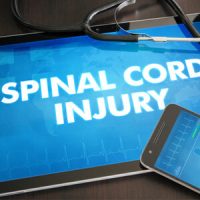Spinal Cord Injury Victims

Many car accidents, slip and fall accidents, bicycle and motorcycle accidents result in spinal cord injuries. If you were injured in any kind of accident, you may suffer from spinal cord injuries that are either temporary or permanent. While every accident and every patient is different, the most common types of spinal cord injuries suffered after serious accidents are listed below.
Complete Vs. Incomplete
While spinal cord injuries may be temporary or permanent, they may also be complete or incomplete. If a medical professional refers to a spinal cord injury as complete, this means that the injury will render the patient completely unable to move any part of the body below the area of the injury. The area below the injured spinal cord area will not have any sensation/feeling, and the chances of making a full and complete recovery to a physical condition that existed prior to the accident is nearly impossible. If a medical professional refers to a spinal cord injury as incomplete, it means that the patient may be able to feel some sort of sensation below the area of injury and even be able to move parts of their body. In these cases, there is hope that the patient will be able to make a recovery, even if it is a partial one, in time.
Injury Levels
A physician will determine the level of a spinal cord injury. This determination will be the foundation upon which a treatment plan is developed. For example, if a patient’s spinal cord injury is high near the neck, they may still be able to breathe or even move their legs or arms. However, if a spinal cord injury is much lower on the back, the patient may not be able to move any part of his/her body or even breathe without assistance. All of these different factors will allow a physician to make a decision regarding the best course of action and treatment for a spinal cord injury patient. Oftentimes, patients will need to stay in the hospital for observation or to receive physical therapy. Other patients may be able to immediately return home and simply have therapy or other medical treatments in their own home.
Common Types of Spinal Cord Injuries
Following an accident due to someone else’s negligence, the most typical types of spinal cord injuries suffered by a victim may include the following:
- Whiplash (this may be minor and resolved within a few days or weeks, or severe.)
- Herniated discs and ruptured discs
- Spinal fractures
- Facet Joint Injuries
- Spinal Stenosis
- Direct injuries to the spinal cord itself
Contact an Experienced Accident Lawyer
Spinal cord injuries typically are very expensive to treat and take a significant amount of time under the care of a medical professional. If you were injured in an accident and suffered a spinal cord injury, the Columbia personal injury attorneys at the Stanley Law Group can help you build a strong personal injury case. Our awards and accolades that represent how we have protected the rights of those we represent speak for themselves. Contact us today at 803-799-4700 to let us help you receive the compensation you deserve.
Resource:
medscape.com/answers/793582-161636/what-is-the-difference-between-a-complete-and-incomplete-spinal-cord-injury-pci
https://www.thestanleylawgroup.com/medical-malpractice-and-hospital-acquired-conditions/

